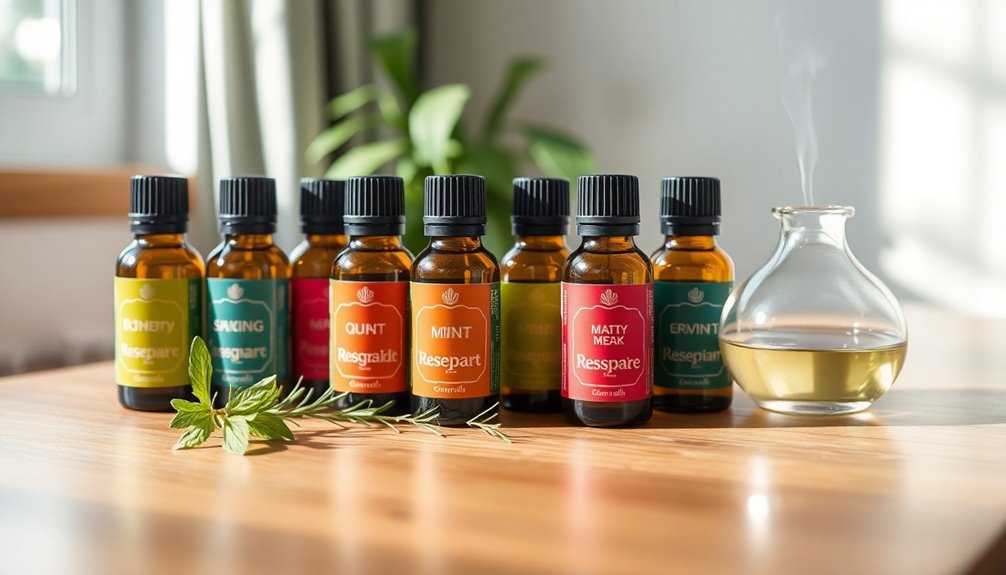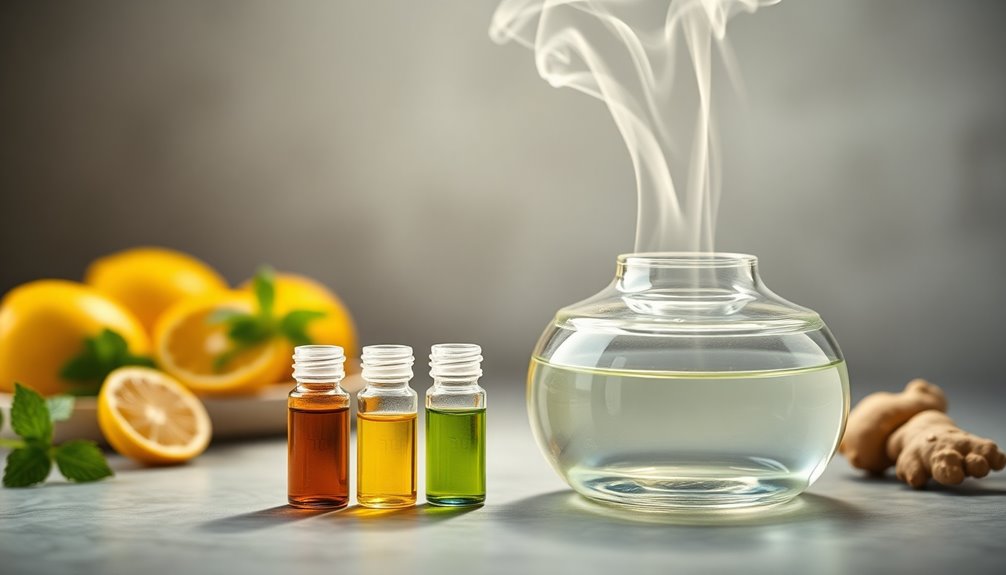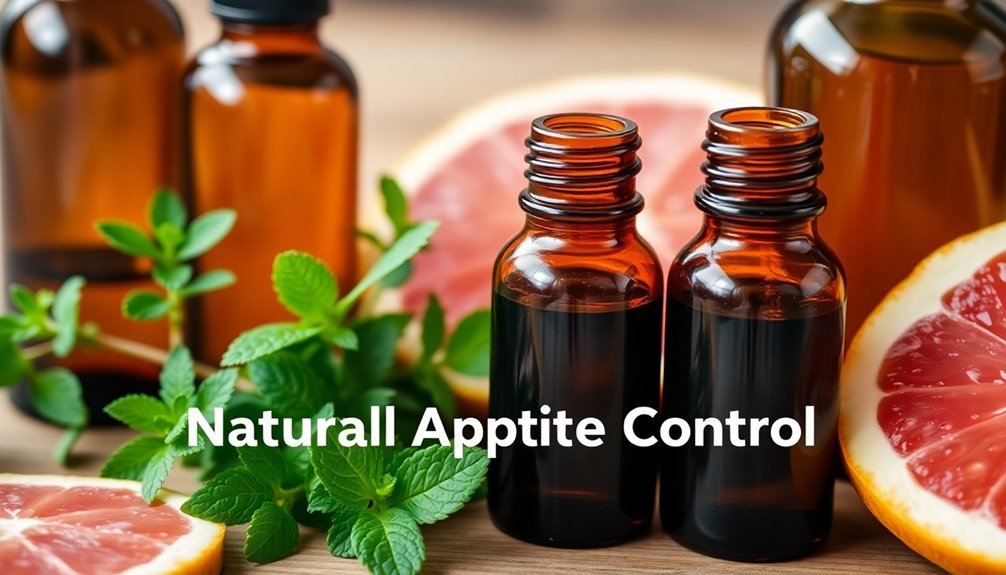Essential oils like grapefruit and peppermint can help curb your appetite naturally. These oils work by influencing hormones that control hunger, promoting feelings of fullness, and stimulating gastric juices. Grapefruit oil can boost your metabolism, while peppermint increases leptin levels and decreases ghrelin, helping you resist cravings. You can inhale these oils or apply them diluted to your skin for the best results. Remember, essential oils work best with a balanced diet and healthy lifestyle. If you want to explore the best oils for appetite management, you'll find more useful insights ahead.
Key Takeaways
- Grapefruit and peppermint oils effectively suppress appetite and boost metabolism, aiding in hunger control.
- Essential oils activate the vagus nerve, enhancing feelings of fullness and regulating hunger signals.
- Cinnamon and fennel oils help regulate blood sugar and curb cravings for unhealthy foods.
- Inhaling essential oils can stimulate gastric juices, promoting fullness and reducing the urge to snack.
- Combining essential oils with mindful eating and healthy lifestyle practices enhances overall appetite management and weight loss efforts.
Understanding Appetite Control

When you think about appetite control, it's important to recognize how hormones like leptin and ghrelin play an essential role in regulating your hunger and satiety.
Leptin promotes fullness, while ghrelin stimulates your appetite. Achieving hormonal balance is imperative for effective appetite suppression.
The vagus nerve also connects your stomach and brain, mediating signals of fullness and hunger.
Stress and sleep deprivation can trigger food cravings, underscoring the significance of emotional well-being in appetite regulation.
Certain essential oils, like grapefruit and peppermint, can help manage these cravings by positively influencing your hormones. Additionally, achieving hormonal balance through techniques such as relaxation and sleep can significantly enhance appetite control.
Benefits of Essential Oils

When you explore the benefits of essential oils, you'll find they play an important role in appetite regulation.
Oils like grapefruit and peppermint not only suppress cravings but also influence hormones that control hunger.
Appetite Regulation Mechanisms
Essential oils play a significant role in regulating appetite by interacting with key physiological mechanisms.
When you inhale essential oils like peppermint or grapefruit, they can influence the vagus nerve, connecting your stomach and brain, and signaling feelings of fullness. The aromatic compounds in these oils stimulate gastric juices, enhancing satiety and reducing cravings.
Importantly, peppermint essential oil can increase leptin levels, the hormone that promotes fullness, while decreasing ghrelin, the hunger hormone. Citrus oils also activate metabolic processes and appetite-suppressing enzymes, aiding in weight management. Additionally, curcumin absorption from turmeric can be enhanced with black pepper extract, which may further support overall health and wellness.
Natural Craving Suppressants
While you might struggle with cravings from time to time, incorporating essential oils into your routine can provide natural relief.
These natural craving suppressants can help you manage your appetite effectively:
- Peppermint Oil: The scent reduces calorie intake by influencing hunger hormones, helping you feel fuller.
- Grapefruit Oil: Contains nootkatone, which promotes calorie metabolism, making it a powerful appetite suppressant.
- Lavender Oil: Helps control cortisol levels, reducing stress-related cravings and emotional eating.
- Fennel Oil: Not only suppresses appetite but also aids digestion, supporting your weight management efforts. Additionally, using essential oils in dilution guidelines ensures safe and effective application for appetite control.
Key Essential Oils for Appetite

If you're looking to manage your appetite naturally, several key essential oils can make a significant difference. Here are some you should consider:
| Essential Oil | Benefits | How to Use |
|---|---|---|
| Grapefruit Essential Oil | Stimulates metabolism and suppresses appetite | Diffuse or apply topically |
| Peppermint Essential Oil | Promotes fullness and enhances calorie burning | Inhale or add to water |
| Cinnamon Essential Oil | Regulates blood sugar, curbing cravings | Mix in smoothies or teas |
| Fennel Essential Oil | Reduces cravings for sugary foods | Use in cooking or teas |
| Bergamot Essential Oil | Minimizes emotional eating | Diffuse or apply topically |
Incorporating these oils into your routine can help you feel more satisfied and curb those cravings effectively. Additionally, supporting digestive health through the use of natural remedies like these oils can enhance overall wellness.
How Essential Oils Work

Understanding how essential oils work can help you harness their appetite-managing benefits effectively.
These powerful extracts interact with your brain's hypothalamus, influencing hormones that control hunger. Here's how they can curb appetite and reduce cravings:
- Suppress Hunger: Oils like grapefruit and peppermint help signal fullness, reducing caloric intake.
- Activate the Vagus Nerve: Aromatic compounds stimulate the stomach, enhancing satiety through gastric juices.
- Balance Blood Sugar: Inhaling essential oils triggers the production of craving-curbing gastric juices, stabilizing blood glucose levels.
- Boost Metabolism: Many essential oils stimulate fat burning, decreasing fat and triglyceride accumulation in your body.
Application Methods for Oils

When it comes to harnessing the appetite-suppressing benefits of essential oils, choosing the right application method can make all the difference.
You can apply essential oils topically on pulse points, like your wrists and behind your ears, for localized appetite suppression. Inhalation is another effective method; use personal diffusers or place a few drops on a cotton ball for quick absorption into your bloodstream.
For a relaxing experience, add essential oils like grapefruit or peppermint to a warm bath, enhancing your aromatherapy session. Room diffusers are great for dispersing essential oils throughout your space, helping to curb cravings. Additionally, incorporating essential oils with natural antibacterial properties can further support your overall wellness while managing appetite.
Just remember to dilute essential oils with a carrier oil to guarantee safe application and prevent skin irritation.
Safety and Usage Guidelines

When using essential oils, it's vital to dilute them properly to avoid skin irritation, so always mix 1-2 drops with a carrier oil.
Consulting with a healthcare professional before starting any new regimen guarantees you're on the right track, especially if you have existing health concerns.
Regular use, alongside a balanced diet, can enhance the benefits, but remember, essential oils aren't a quick fix. Always perform a patch test before applying diluted oils widely to ensure you don't have an adverse reaction.
Proper Dilution Techniques
Proper dilution techniques are essential for safely using essential oils, guaranteeing both their effectiveness and your well-being.
Always dilute essential oils with a carrier oil, like coconut or olive oil, to prevent skin irritation.
Here's how to do it safely:
- Topical Application: Mix 1-2 drops of essential oil per teaspoon of carrier oil.
- Aromatic Use: Add 5-10 drops of essential oil to 100 ml of water in your diffuser.
- Patch Test: Apply a small diluted amount on your skin and wait 24 hours to check for reactions.
- Storage: Keep essential oils in dark, glass containers away from light and heat.
Following these steps guarantees you enjoy the benefits of essential oils without harm.
Consultation With Professionals
Before diving into the world of essential oils, it's wise to consult with healthcare professionals, especially if you have pre-existing conditions or take medications. This consultation helps guarantee your safety while using these oils.
Essential oils must be diluted with carrier oils for topical application to prevent skin irritation or allergic reactions. Remember, not all essential oils on the market are of high quality, so seek pure, therapeutic-grade options.
Regularly monitor how you respond to essential oils, as effects can vary based on personal health factors.
Finally, keep in mind that essential oils aren't substitutes for a balanced diet and healthy lifestyle; they should complement your overall wellness approach.
Always prioritize safety in your journey with essential oils.
Regular Use Recommendations
To safely enjoy the benefits of essential oils, always dilute them with a carrier oil before applying to your skin. Regular use can enhance appetite suppression, but it's crucial to follow these guidelines:
- Patch Test: Always perform a patch test to check for allergic reactions, especially if you have sensitive skin.
- Inhalation: Use a diffuser or inhaler for quick emotional benefits and appetite control without adverse effects.
- Consult Professionals: Talk to a healthcare professional before starting essential oils, particularly if you're on medication.
- Balanced Lifestyle: Remember, essential oils shouldn't replace a balanced diet and healthy habits. Additionally, maintaining a healthy indoor air quality can support overall wellness, making it easier to achieve your health goals.
Clinical Evidence and Studies

While many people seek natural methods for appetite control, clinical evidence increasingly supports the effectiveness of essential oils in this regard.
A 2007 study showed that inhaling peppermint essential oil led participants to consume thousands of fewer calories, demonstrating significant appetite suppression.
Research from 2005 revealed that grapefruit essential oil activated saliva enzymes, resulting in reduced hunger urges.
Additionally, a 2010 study found that lavender essential oil helped control cortisol release, decreasing cravings and promoting better sleep—important for weight management.
Moreover, bergamot essential oil has been linked to lowered cholesterol and appetite suppression.
Essential oils like ginger and cinnamon also enhance metabolic rates and regulate blood sugar, further solidifying their role in appetite control and effective weight management strategies.
Holistic Approach to Weight Loss

A holistic approach to weight loss recognizes that achieving and maintaining a healthy weight involves more than just diet and exercise; it also encompasses mental and emotional well-being.
By addressing these aspects, you can create a more balanced lifestyle. Consider these key elements:
- Mindful Eating – Pay attention to what and how you eat, savoring each bite.
- Stress Management – Use calming essential oils like lavender to reduce cortisol levels.
- Quality Sleep – Prioritize restful nights to regulate appetite hormones.
- Metabolic Support – Incorporate essential oils like grapefruit and peppermint to enhance metabolic processes.
Additionally, focusing on emotional and psychological growth can significantly influence your relationship with food and self-image.
Incorporating Oils Into Your Routine

Integrating essential oils into your daily routine can enhance your holistic approach to weight loss by addressing both physical and emotional aspects of appetite control.
Start by diffusing calming essential oils in your living space to create an atmosphere that helps curb appetite and reduce stress-related eating.
You can also apply appetite-suppressing oils, like peppermint or grapefruit, mixed with a carrier oil on your pulse points.
Inhale oils like wild orange or cinnamon during meals to promote mindfulness and become more aware of your eating habits.
Additionally, incorporate essential oils into your bath rituals with lavender or ginger to aid digestion and manage cravings.
To keep their effects strong, rotate the essential oils you use daily. Incorporating oils with antimicrobial properties can also support your overall health and well-being during your weight loss journey.
Frequently Asked Questions
What Essential Oils Are Good for Suppressing Appetite?
If you're looking to suppress your appetite, consider trying peppermint, grapefruit, or wild orange essential oils.
Peppermint can help you feel fuller, while grapefruit may reduce cravings when inhaled. Wild orange not only lifts your mood but also helps control anxiety that often leads to snacking.
Fennel and cinnamon essential oils are also effective; fennel aids digestion and sleep, and cinnamon regulates blood sugar levels, making them great choices for appetite control.
Which Oil Is Used as an Appetite Suppressant?
When you're looking for an oil that serves as an appetite suppressant, grapefruit essential oil stands out. It activates enzymes that help reduce cravings and stabilize your blood sugar levels.
You might also consider peppermint essential oil; it boosts leptin production, signaling fullness while lowering ghrelin, the hunger hormone.
Both oils can be great allies in managing your appetite naturally, keeping those pesky cravings at bay and supporting your overall weight management goals.
How Can I Shrink My Appetite Naturally?
When it comes to shrinking your appetite naturally, you can certainly have your cake and eat it too.
You might start by drinking plenty of water, which can help you feel full. Eating high-fiber foods, like fruits and vegetables, can also keep hunger at bay.
Don't forget to manage stress, as it often leads to cravings. Incorporating regular exercise into your routine can further help you maintain a healthy appetite.
What Scents Suppress Your Appetite?
When you're looking to suppress your appetite, certain scents can help.
Try inhaling peppermint; it's known for promoting feelings of fullness.
Grapefruit's aroma might boost your metabolism while reducing cravings.
Wild orange can lower stress, which often drives unhealthy eating.
Fennel's scent can curb those pesky cravings for sweets and carbs.
Finally, lavender helps manage stress levels, supporting better appetite control.
Explore these scents to stay on track with your goals!
Conclusion
You might think that using essential oils for appetite control is just another trend, but they've been valued for centuries for their natural benefits. By incorporating them into your routine, you can curb hunger and support your weight loss goals effectively. Plus, they offer a holistic approach that goes beyond just diet and exercise. Embrace the power of nature, and you'll find it easier to manage cravings while enjoying a healthier lifestyle. Give it a try!










